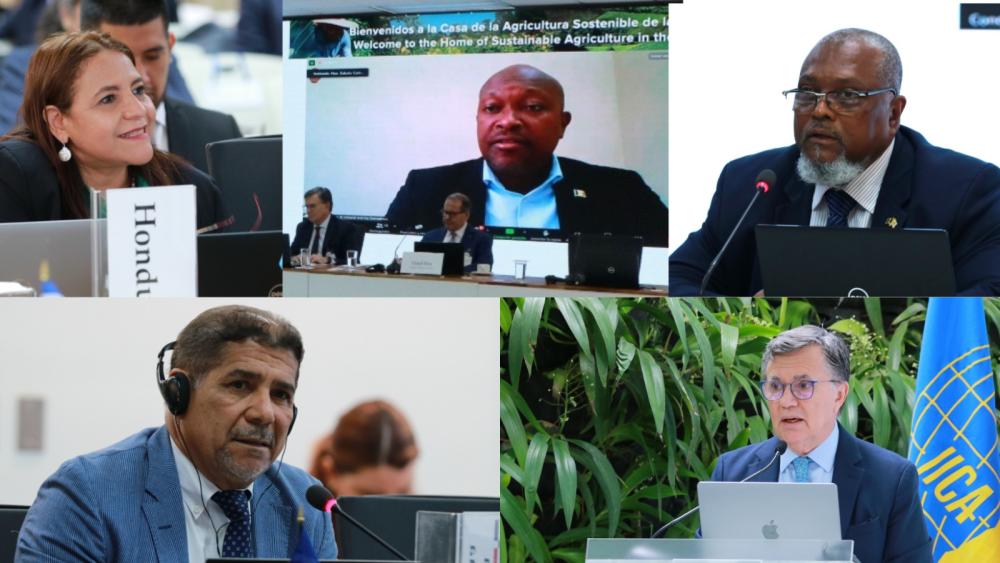Agriculture ministers and senior officials of the Americas join forces to drive the IICA-led Hemispheric Partnership for Food Security and Sustainable Development

San Jose, 20 July 2023 (IICA) – Agriculture ministers and senior officials of the Americas, attending a meeting of the Executive Committee of the Inter-American Institute for Cooperation on Agriculture (IICA) in San Jose, Costa Rica, expressed their support for the Hemispheric Partnership for Food Security and Sustainable Development, launched by the hemispheric organization.
The partnership seeks to continue fulfilling the mandate that has guided the specialized agency for agricultural and rural development throughout its history. This, in short, consists of building bridges between countries and other stakeholders to promote consensus building and joint actions, at a time in which multidimensional crises are increasing the region’s responsibility to serve as guarantor of the world’s food security and environmental sustainability, given its wealth of natural resources and biodiversity.
In essence, the partnership stems from the recognition that agriculture is in a position to become a key strategic pillar for the sustainable development of countries in the hemisphere. This became a key issue of this meeting of the Executive Committee, which is one of the Institute’s governing bodies. The two-day event at IICA Headquarters brought together 14 ministers of Agriculture and other senior officials of the agriculture sector of the Americas, representing 25 countries. Representatives of international organizations and permanent observers from other continents were also in attendance.
During the meeting, IICA Director General, Manuel Otero, recalled that the organization was born in 1942 when a group of countries from the hemisphere came together to address a major concern – the supply of raw materials during the Second World War. “Today”, he said, “in an era of converging crises, hemispheric partnership is more relevant than ever, given that no country can save itself singlehandedly and the issues faced are common to all”.
Therefore, the initiative has a political dimension, aiming to generate unified positions among countries in the region, which the region will therefore be in a stronger position to defend. It also has a strategic dimension, involving the creation of networks and platforms that emphasize the notion of supranationalism, as the basis for developing concrete actions that can create an impact and contribute to strengthening institutional structures.
Otero expressed the view that food insecurity and poverty cannot be resolved by food production alone, but that an intersectoral approach is needed. He insisted that, “The ministries of Agriculture cannot resolve these issues by themselves, although they do play a key role. Our concept of agrifood systems encompasses all stages - from production to consumption. This is reflected in the sixteen messages that the countries and IICA presented at the United Nations Summit, demonstrating the region’s unified position regarding the irreplaceable role of agriculture”.
He also stressed that agriculture must not only seek to improve productivity, but must include a social dimension, given its obligation to improve people’s standard of living.
Consensus for action
The Hemispheric Partnership for Food Security and Sustainable Development, launched by IICA, seeks to identify strategic partners—international organizations, private sector companies and civil society organizations—for the purpose of creating synergies and aligning ongoing actions in agriculture, in order to bolster food security and support efforts to tackle climate change.
IICA Director of Technical Cooperation, Federico Villarreal explained to the ministers and authorities present at the meeting that the partnership covers eight main strategic areas: science; technology and innovation; bioeconomy; the production, economic and social inclusion of family farming; water and agriculture, climate action; equity and equality; One Health and international trade.
IICA has organized multiple events focusing on these areas and will host many more in the coming months, to enable a variety of perspectives to be heard and to generate consensus for action. A key milestone in this process will be the Conference of Ministers of Agriculture, scheduled for October 4 and 5.
“There are certain areas in which IICA is playing a fundamental role. One of these is the creation of strategic partnerships at all levels with other organizations, governments and entities that can change the history and direction of agricultural production throughout the region”, said Laura Suazo, Secretary of Agriculture and Livestock of Honduras.
Suazo explained the need to identify alternative sources of funding for agriculture in countries like Honduras. “We can see that, to some extent, funding for agriculture comes from public funds, provided by the Government. At times, it is generated through taxes, but it is often financed through international indebtedness, which comes with high interest rates. Therefore, we need more attention to be paid to this issue of agricultural funding”.
Panama’s Minister of Agricultural Development, Augusto Valderrama, also expressed his support for the partnership, agreeing that the agriculture sector plays an important, strategic role in the social development of our people and “more than providing food, as has been said, also provides stability and better living conditions for farmers and for a large part of our population”.
“Our combined strengths as a region make us the best country in the world. We need to take the best of what we each have to improve our production capacity and expand our markets”, said Cruz, who spoke about the importance of sharing best practices, knowledge and information, for example on green financing, which represents an opportunity for the developing countries.
More information:
Institutional Communication Division.
comunicacion.institucional@iica.in